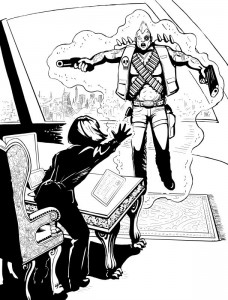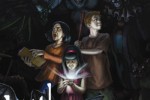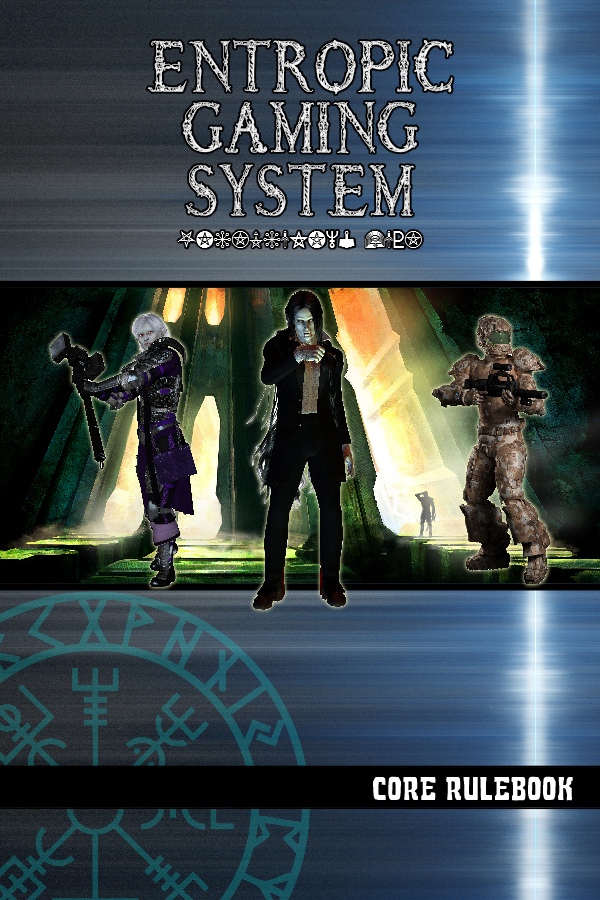Psi-Punk
Psi-Punk is a complete roleplaying game powered by FUDGE and being published by Accessible Games.
By Jacob Wood

Welcome to the fortieth Designer’s Diary, a regular column where designers are given the opportunity to take readers on an in-depth ride through the design and development process of their system, setting, or product. If you’d like to share your product in the Designer’s Diary column, send a message to aaron@roleplayerschronicle.com.
Support Psi-Punk here
Designer’s Description
Psi-punk is “a Fudge-based cyberpunk RPG with a psychic twist.” In regards to what Psi-punk really is, that’s the attention-grabbing way of saying “it’s complicated.”
Though the game is based on the acclaimed Fudge system, I have completely hacked and redesigned many elements from the ground up. Fudge was designed to be tinkered with, and I’ve taken that notion to another level to deliver something that Fudge fans will still find familiar, but will need to read carefully to get the most out of. Everything you need to play (short of dice, paper, pencils, and friends) is contained in this one book – no additional Fudge material or experience is required.
So what exactly do I mean by “a cyberpunk RPG with a psychic twist?” Lots of cyberpunk and near-future games feature psionics as a way to offer supernatural powers without trying to explain the existence of magic. However, Psi-punk brings a focus on mental powers to the forefront – together we’ll explore what it means to be a gifted psychic in a mundane person’s world and what the existence of psychic powers means for technological advancement.
Psionics aren’t just a character feature that gives players the power to set things on fire with their minds (though that is an option). It’s integrated completely with the system and with the setting in a variety of unique ways. The entire world revolves around breakthroughs in psycho-technical devices, dubbed “magic” by its creators. Through these magic devices, the state of technology has been completely changed.
Purpose
Psi-punk began as a pet project, a way to play with the Fudge system and see what it could do. Over time, it developed into a full-featured, complex RPG with an interesting history. I seriously decided to publish the book when its page count in MS Word hit around 140 pages. I thought to myself “there’s something special here; this isn’t just a way to pass time anymore.”
Perhaps that doesn’t paint the picture accurately though. I have always been a game designer at heart, and this isn’t the first “big” project I’ve worked on. As part of a personal goal, I have always wanted to publish an RPG that I could share with others, and I have long been interested in making RPGs more accessible – especially for people with disabilities (that’s where I get the company name, Accessible Games). By publishing a game based on the Fudge system, with its ease of entry for new players and its word-based system that keeps math to a minimum, I hope to offer a product that anyone can enjoy.
Psi-punk is just the first in what will be a long line of great gaming products from Accessible Games. We already have a few others in the works, but this is our first major release and will hopefully set the tone for things to come.
Influences
I have drawn on a lot of different sources of inspiration for Psi-punk. From early cyberpunk fiction such as Gibson’s Neuromancer to modern works such as Xenoform by Mike Berry, I drew from ideas that I feel are important concepts to the cyberpunk genre. Then I threw half of them out and started fresh.
I also looked at a lot of other cyberpunk games on the market today and took the same approach. I love Shadowrun and Interface Zero, but my goal was not to just make a Fudge variant of a proven system or universe. One of the most important aspects of an influential work, in my opinion, is its ability to demonstrate what doesn’t need to exist in similar products.
Research
One of the great things about science fiction is that it’s just that – fiction. It’s easy to write about pseudo-science because it doesn’t necessarily have to conform to known laws.
That being said, there’s also that pesky “science” aspect, which demands a bit more detail. I found answers to a lot of questions, from “what is the top lifting weight of Olympic athletes?” to “what sounds are made at a certain decibel level?” I knew that I could get away with a certain level of abstraction, but that it was still important to keep trait levels and statistics realistic. When writing science fiction, it’s important to know what your limits are before breaking them wide open with the appearance of supernatural abilities and super-tech advancements.
Art Direction
I am currently raising money through Kickstarter so that we can hire Melissa Gay, renowned for her work on The Dresden Files RPG, Part-Time Gods, HERO System products, and Mermaid Adventures. Melissa is a fabulous artist with a talent for capturing detail and realism even in a fantastical setting.
Our promotional art shows you what you can expect out of Melissa for the upcoming Psi-punk core rulebook. Our goal is to have beautifully detailed illustrations that exhibit everything you’ll expect to find within the book, from psionics and cybernetics to futuristic technology and sweeping cityscapes.
We have chosen to go with black and white images to give the book an “old school” feel in contrast with its new world design. The cover art will be in full color, and will even feature the likenesses of our highest-level Kickstarter backers.
Gaming Experience
Psi-punk was designed from the ground up to be a character-centric role-playing game. I recognize that doesn’t say much by itself – after all, aren’t all RPGs supposed to be character centric? Well, it’s not always that simple.
I mentioned before that Shadowrun has been an influence, but one of the key issues that many people have with the system is the way in which the Matrix is handled. All too often players raise concerns about losing interest or going for food breaks when the GM and the Decker start going into their own little sub-game. I love how in-depth and detailed Shadowrun’s hacking system can be, but feel that its focus is more on the sub-system of hacking than on the characters.
The design philosophy was to keep everything character-focused as much as possible, so players don’t have time to get bored. This meant taking a step back and looking at every mechanic – and especially every sub-system – and looking at it from a player’s perspective. The question “is this fun?” always trumped the question “is this cool?” There is certainly room for “cool” too, and while playtesting the game we’ve found that “cool” often follows “fun” wherever it goes.
Everything from ‘Net hacking and carjacking to astral projection has been designed to add plenty of flavor to the game while getting the system out of the way. Even a vehicle chase scene can be resolved in just a few dice rolls so the non-drivers in the party can get back into the action quickly.
What this ultimately means is a fast, simple, and fun gameplay experience. Psi-punk isn’t as much a numbers game as it is a game about customizing your character and having fun with him (or her). Even the game’s Wealth system uses words in place of numbers to explain the cost of goods, so you’ll be able to put away the calculator and just put together what feels right.
Comparison
One of the great things about Psi-punk is that it’s similar enough to be familiar but different enough to offer something new, even to long-time cyberpunk or Fudge veterans. Even Fudge enthusiasts have to re-think the way they look at the game’s mechanics since it can be very different from the “core” Fudge experience, but that’s because our system changes were designed with that character-centric philosophy in mind.
Likewise, cyberpunk fans will have the opportunity to challenge their concept of what “cyberpunk” means. Though I love the gritty, hardcore dystopian futures presented by Gibson and others, I took a slightly different approach to the setting. Megacorporations still rule and technology reigns supreme (and it still has the potential to leave a terrible imprint on humanity), but I abolished some standard tropes to offer a different viewpoint on many concepts that have become old or stale.
For example, characters in this setting do not “jack in” to Virtual Reality, thereby leaving their real selves vulnerable to cyber-attacks. People wizened up to the dangers of VR when they realized that folks were actually getting killed in a virtual world. That simple shift in the way the ‘Net is handled has a rather large impact on the way computers and hacking work for the general public.
Psi-punk is accessible – both to genre or system veterans and to newcomers alike. It doesn’t exclude anyone, but doesn’t make compromises either. It offers a new and unique way to look at the genre and the Fudge system that current fans and newcomers alike can understand and enjoy.
Development Process
Work on Psi-punk began a little over two years ago, but some of the setting’s concepts have been alive and in the back of my mind for over a decade. A long time ago, I had an idea for a very basic game concept: what if “magic” was just the name people used for technology that could do incredible things? Devices that could cause seismic activity and generate earthquakes powerful enough to level buildings, or other devices that could generate fire out of thin air. These devices could handle a wide range of powers and be either commonplace (for basic goods like “lighters” and “lamps”) to prototypes (for earthquake-causing super magic).
The idea was shelved for years, but in the summer of 2010 it resurfaced when I started thinking about what I could do with the Fudge system. Frustrated that even the Fudge Psi system used power points, I began working on a Psi system that didn’t have daily usage limits; after all, you never see comic book characters or people in movies “run out” of magic or mental powers. Once I had a psionics engine, the idea came to me to bring back the old “magic devices” idea and blend it into the setting.
I then focused on building the rest of the setting around the duality of psionics (innate mental powers that gifted individuals possess) and magic (technological devices that emulate psychic abilities). Everything after that, from the setting’s story to the game’s mechanics, was designed with those two core elements in mind. Even the decision to go with a cyberpunk setting was based on these principles; it wouldn’t do to have high-tech devices that mimic supernatural powers in a modern (let alone pre-modern) era. It could have been done in a variety of other futuristic settings, but I’ve always had an attraction to the cyberpunk genre, so it stuck.
After that, I spent nearly two years writing, researching, and designing the game. Meanwhile, I began getting involved with the RPG community through websites like RPGGeek.com, Twitter, and Google+. Through RPGGeek I met Melissa Gay, the game’s artist, and through Twitter I met Chris Perrin, the game’s editor.
The end of the design process is now in sight. We are running a Kickstarter campaign to raise money so we can finish paying Melissa and Chris for their work, and hire a local layout artist to put it all together and make it pretty. Meanwhile I’m finishing up some of the final design details and thinking about the future – how we’re going to package up the book, print it, and ship it to all of our backers and new supporters alike.
There is still time to get involved with the Kickstarter and help make this game a reality. Visit the Kickstarter page to pledge your support and please share word of it with your friends and fellow gamers. http://www.kickstarter.com/projects/accessiblegames/psi-punk-a-fudge-cyberpunk-rpg


